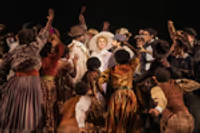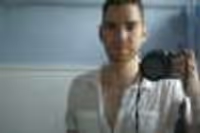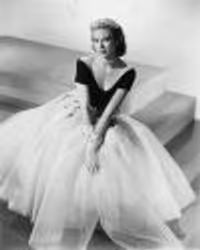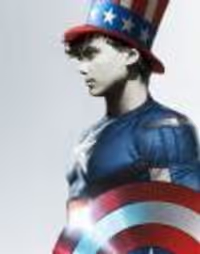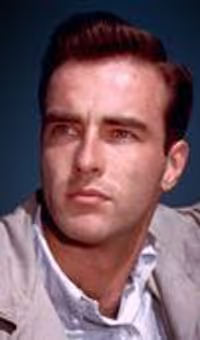Into The Woods: the Witch and Rapunzel
#150re: Into The Woods: the Witch and Rapunzel
Posted: 8/8/12 at 9:48pm
I should mention that Rapunzel's twins are more than just dust... there are bones. They don't necessarily read well from a distance and may get tangled in the blanket, but there are in fact dust and bones. I believe they were also present in Regent's Park.
That makes the effect and impact even more powerful. Rapunzel was in fact actually pushing around dead babies. In the Regent's Park video, the Witch cradles the baby's skull at the end.
#151re: Into The Woods: the Witch and Rapunzel
Posted: 8/8/12 at 9:56pm
Jeeze, Louise, Eric! I just today found out that the Regent Park version is available on line! I can barely stand the shame of not having watched it in the four hours since I learned of its existence. :roll eyes:
Henrick, in the original Broadway version (per the video I watched again the other night (Eric, please take note) and the published libretto, Rapunzel's twins seem healthy enough. They are just dolls in her arms at the end of Act I and then forgotten in Act II.
The Regent Park solution seems much, much better.
I suppose you might blame the dead babies on the witch's curse, though giving birth to babies that die is a different definition of "barren" than we would apply to the Baker's Wife. I think I'd rather believe the dead grandchildren are the result of years of banishment in the desert or Rapunzel's madness rather than a sloppy curse. But your way works, too.
Either way, what a chilling moment!
***
Robbie, I think "and your mother died" has to be literal, since it isn't mentioned anywhere else and the Baker doesn't seem to feel abandoned by his mother as he does by his father. So either the "them" is a mistake, or it refers to the Baker's Father and the young Baker himself, the two remaining members of the clan.
"So I laid a little spell on them--
You, too, Son!"
could mean them "and you in addition", or them "including you". After all, the curse ends up including the Baker's wife as well, even if she isn't physically sterile. So "them" includes at least three people, even without counting Rapunzel.
#152re: Into The Woods: the Witch and Rapunzel
Posted: 8/8/12 at 10:19pmGaveston, I think I also like the idea that her touching them might have been what killed them. Not sure but I think you might have suggested that in a post below. Of course she can touch Rapunzel before she loses her powers, but after may be a different story.
#153re: Into The Woods: the Witch and Rapunzel
Posted: 8/8/12 at 10:26pm
I always took the "died" as literal, as well, though now that I think about it, I can see where there's some confusion...
" Jeeze, Louise, Eric! I just today found out that the Regent Park version is available on line! I can barely stand the shame of not having watched it in the four hours since I learned of its existence. :roll eyes: "
Don't you roll your eyes at me, young man! :P Seriously, if you did just find out it was available, I completely missed that post, so I'm sorry--I only meant that you *could* see the scene in a way, despite Henrik pointing out that it was too bad you couldn't see the production in New York... :P
I stay with my interpretation that the deluded, completely destroyed Rapunzel has been carting around dead babies for a while (we certainly never hear any crying, unlike with Cinderella's child), but it's definitely interesting to see how everyone reads the moment.
After Eight
Broadway Legend Joined: 6/5/09
#154re: Into The Woods: the Witch and Rapunzel
Posted: 8/8/12 at 10:44pm
"it should be pointed out that ITW doesn't use Perrault as a source."
Duh, obviously. That's the problem!
It's all fine and dandy to state that this is not based on Perrault, but that's the version that is part of the accepted, universal collective consciousness. And it's the understanding of this fact by the creators of Into the Woods that provides them with the groundwork for their rancid subversion.
What it all boils down to is this. Let us have us the characters and stories as they are universally known and loved. They have no need of reinvention, reconstruction, deconstruction, or subversion. We don't give a good God damn about their Freudian, Jungian, or dime-store-psychologist's subtext, intertext, metatext, or microtext. Nor do we want to listen to pretentious lectures about how children will listen.
All we want is the one thing they refuse to give us: a good time.
#155re: Into The Woods: the Witch and Rapunzel
Posted: 8/8/12 at 11:06pm
Gaveston, I think I also like the idea that her touching them might have been what killed them. Not sure but I think you might have suggested that in a post below. Of course she can touch Rapunzel before she loses her powers, but after may be a different story.
Obviously, the context in Act II is quite different. But, yes, it was I who noted her lines in Act I:
"Sometimes the things you most wish for
Are not to be touched!"
The fact that she can't touch the ingredients for her own restoration spell is a major plot point in Act I.
At the very least, the Act II effect is heavy with irony.
Updated On: 8/9/12 at 11:06 PM
#156re: Into The Woods: the Witch and Rapunzel
Posted: 8/8/12 at 11:08pmI think your entire post is fair and fine, as long as you change those plurals to the singular. I do think there's some truth that the show takes some delight in going back to the often lesser known Grimm versions of the stories, though I don't see that in and of itself as a problem (though as stated, Red Riding Hood is much better known now in the Grimm version with the Huntsman ending rather than the, pardon me, grim ending Perrault gave it as a cautionary tale).
#157re: Into The Woods: the Witch and Rapunzel
Posted: 8/8/12 at 11:08pm
Speak for yourself. I consider Into te Woods a good time and have since I was a child.
#158re: Into The Woods: the Witch and Rapunzel
Posted: 8/8/12 at 11:16pm
All we want is the one thing they refuse to give us: a good time.
Oh, Mary, please! Yes, ITW offers such a crummy time that all of us have seen it at least a dozen times, masochists that we are.
Perrault's version is the "accepted, universal collective unconscious"? Try telling that to Germans or anyone in a Germanic country. I have no idea what the Slavs read, but I know Africans have their own equivalents to myths and fairy tales.
Even in the U.S., most of us read Grimm and know Perrault only by way of Disney adaptations.
And "nobody cares about Freud and Jung"? Nobody on Mars, perhaps, but in the modern world, especially in the West, everything in the past century has been based on or refers to their work.
#159re: Into The Woods: the Witch and Rapunzel
Posted: 8/8/12 at 11:18pmAs for the babies the first time I saw it my first thought was that they turned to dust when she touched them, not that Rapunzil had been pushing around dead babies. Rapunzil pushing around dead babies is a more reality based explanation but in this staging act 2 is being presented as a nightmare in which the people the characters love most are all dying and being taken from them. In this dream scape you don't a need tidy explanation of how, when, or why the babies died.
After Eight
Broadway Legend Joined: 6/5/09
#160re: Into The Woods: the Witch and Rapunzel
Posted: 8/8/12 at 11:19pm
"I think your entire post is fair and fine, "
Wow! I am so thrilled to have your approval!
"as long as you change those plurals to the singular"
Sorry, I'm not taking your orders today.
#161re: Into The Woods: the Witch and Rapunzel
Posted: 8/8/12 at 11:22pm
As opposed to taking all my orders in the past, hey? (Actually that sounds far more inappropriate than I meant to). It's a discussion forum, if you post something I feel alright saying if I agree or disagree with it--no worries.
(Oh, and I happen to think ITW is a good time as well...)
After Eight
Broadway Legend Joined: 6/5/09
#162re: Into The Woods: the Witch and Rapunzel
Posted: 8/8/12 at 11:47pm
"Yes, ITW offers such a crummy time that all of us have seen it at least a dozen times, masochists that we are. "
You said it.
#163re: Into The Woods: the Witch and Rapunzel
Posted: 8/9/12 at 12:08amI think it's interesting that in the 2002 revival, the Witch ate the beans before turning ugly and vanishing. That is one way she could have gotten her powers back!
#164re: Into The Woods: the Witch and Rapunzel
Posted: 8/9/12 at 12:59amOh, Gaveston. How naive you are to think that After Eight lives in the modern world.
#165re: Into The Woods: the Witch and Rapunzel
Posted: 8/9/12 at 9:35am
"what would you have me be, handsome like a prince"
To me this does not mean she is asking if Rapun wants her to look like her boyfriend. In those times, the word handsome also was used for women. To me it means she is asking if Rapun wants her to be beautiful like the prince is beautiful. She sees Rapun's leaving as a rejection of the quality of her love and protection for the shallowness of the glamor of a handsome prince. And she believes it's because she is old, ugly and embarrasses Rapun...a common dynamic as children reach a certain age. The witch is asking would Rapun rather have beauty (a mother she wouldn't be embarrassed to be seen with) over substance (the witch's warped perception of substance anyway)
Of course, anyone can interpret these things any way they want. And certainly, if people feel there is a sexual undertone, sure, why not? But I don't see it as being necessary to interpret it so. I don't see it as a definite undertone. It's not that I "refuse to see it" It's that I don't see it.
I'm an artist and I Believe that a work of art is only partially what the artists thinks it is, or created it to be. Most of what the work of art means actually comes from what the viewer brings to the table...their experience, values, baggage, etc. Good art allows us to explore ourselves. And that exploration is not the same for everyone.
I don't think Gaveston is wrong. But I don't think those who don't see the sexual undertones are wrong either.
#166re: Into The Woods: the Witch and Rapunzel
Posted: 8/9/12 at 7:33pm
Of course, artscallion is right: we can agree to disagree. But as I said above, the Freudian belief that eros is at the heart of the universal Oedipal and Electra complexes is pretty much the basis of all psychoanalytic thinking.
And, pardon me, but ya'll come from some weird families. I swear none of my grandmothers, mother, or many aunts has ever expressed concern as to whether I thought she looked "old". Of course they look older than I, they are of different generations!
And by the same token, it wouldn't occur to me to worry about looking old next to my children or grandchildren. I just assume I do! So what? They don't love me because I look young, I hope, because they can only wind up disappointed!
Behavior is another matter entirely; one generation is always embarrassing another with behavior and that must go double when your mother is a witch. And it is behavior, not appearance, about which Rapunzel complains.
Updated On: 8/10/12 at 07:33 PM
#167re: Into The Woods: the Witch and Rapunzel
Posted: 8/9/12 at 7:38pm
But Gaveston, your mother, grandmothers, and aunts, I presume, didn't have a hump and claws. Your argument would make a great deal more sense if Rapunzel's guardian were a normal woman.
She's not.
She's a beautiful woman who was turned into a witch. It's no mystery why she's self-conscious about her appearance and wants to regain her youth and beauty. It's no mystery why she would have an inferiority complex about her looks and how it affects her daughter.
#168re: Into The Woods: the Witch and Rapunzel
Posted: 8/9/12 at 7:44pm
Then why, henrik, doesn't she say,
"What would you have me be?
As beautiful as a princess?"
I realize the prince reference is a result of Rapunzel's recent dating, but as I've said, what woman uses her daughter's boyfriend as the rule of beauty? I know the adjective "handsome" used to be used for women, as artscallion points out, but it was already passe and a surprise in 1988.
I think it's a miss to ignore the oedipal implications in all the young people, but particularly in Rapunzel, whose mother doesn't feel bound by human conventions.
***
But as for "claws and a hump", I had this one grandmother-- Never mind. That's another story.
Updated On: 8/9/12 at 07:44 PM
#169re: Into The Woods: the Witch and Rapunzel
Posted: 8/9/12 at 7:50pmKad, thanks for the comment last night. I lost my head.
#170re: Into The Woods: the Witch and Rapunzel
Posted: 8/9/12 at 10:43pm
"Then why, henrik, doesn't she say,
"What would you have me be?
As beautiful as a princess?""
If Rapunzel were being courted by a princess, she might very well say that. But the Witch's little girl is being taken from her not by a princess but by a prince.
#171re: Into The Woods: the Witch and Rapunzel
Posted: 8/9/12 at 11:29pm
I do think the lyric, "What would you have me be, handsome like a prince?" is saying exactly that. The Witch realizes she "was not company enough."
Rapunzel is now seeking male companionship and romance. That's something the Witch cannot give her. She isn't enough for Rapunzel anymore.
It's not a sexual competition in question, it's a competition for Rapunzel's attention and affection. And if you don't think "mothers in law" can become hugely jealous of a daughter's affection toward a boyfriend or husband, you haven't "been out there in the world" long enough.
blocked: logan2, Diamonds3, Hamilton22
Brian07663NJ
Broadway Legend Joined: 6/21/06
#172re: Into The Woods: the Witch and Rapunzel
Posted: 8/10/12 at 8:42ambest12bars hit it - I agree - the Witch is using sarcasm to alert Rapunzel that she knows about the Prince visiting her in the tower. If the word was princess then it wouldn't alert Rapunzel that her mother is aware of her sneaking around. Simple as that.
#173re: Into The Woods: the Witch and Rapunzel
Posted: 8/10/12 at 5:49pm
And if you don't think "mothers in law" can become hugely jealous of a daughter's affection toward a boyfriend or husband, you haven't "been out there in the world" long enough.
Yes, but what would Freud and Bettelheim say about such mothers, best12?
#174re: Into The Woods: the Witch and Rapunzel
Posted: 8/10/12 at 5:51pmFreud would say parents and children all secretly want to **** each other.
Videos


